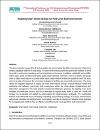Adapting Smart Street Strategy for Post-Covid Built Environment

View/
Date
2023-02Author
Ahmad, Ahmad MohammedAbdelkarim, Shimaa Basheir
Mohammed, Nasir
Mahfouz, Ahmed
Lee, Yongcheol
Naji, Khalid
...show more authors ...show less authors
Metadata
Show full item recordAbstract
The street networks occupy 25% of land use and are the veins of cities. By 2050, more than two-thirds of the world’s population will live in urban areas. The urban street infrastructures and systems are expected to serve the public in performing mandatory and social activities on the streets. In addition, walkability and mobility within urban streets are linked with better public health demands. Therefore, there is a need for the public street to adopt smart features to provide better public health towards limiting the spread of covid.The study aims to develop a framework for smart street strategies to facilitate post covid built environment. The study adopts an integrative approach to deduct the smart street features through a robust literature review and workshops that influence post-Covid built environment within the urban design (Infrastructure) and information management. The study objective includes identifying the processes for adapting smart street strategies and healthcare concerns that can be leveraged to support public health in cities. As a result, the strategy can be adopted and applied by policymakers for implementation worldwide. The contributing features of the effort will focus on tracking, controlling, and preventing analogy. As a result, the framework will provide a baseline for neighborhoods, communities, and cities to develop and integrate novel strategies for managing public health to have an effective and efficient post-Covid pandemic built environment.
Collections
- Architecture & Urban Planning [303 items ]
- COVID-19 Research [924 items ]
- Theme 3: Sustainable Architecture and Urban Planning for Society Wellbeing [32 items ]

